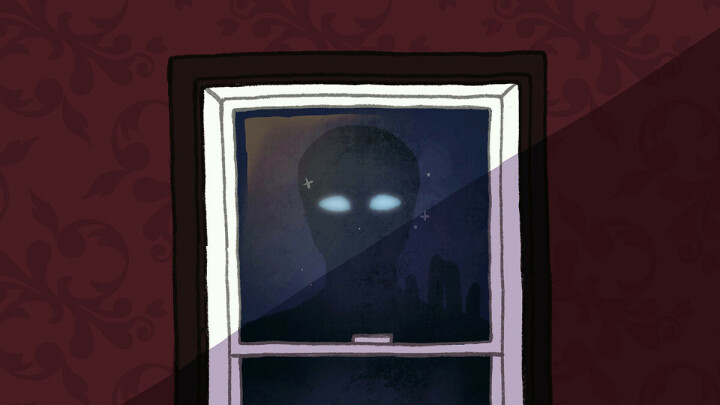Mike Paulus, illustrated by Eva Paulus |
Old Man Winter came to us a months back. Fast and quiet beneath a starlit sky, he slipped down the streets of our city, dragging his skinny ice-capped fingers across our windowsills, his diamond-hard eyes scanning for cracks. Patiently looking for a way inside.
Why? Because Old Man Winter aches for the delicious music of your constant complaining.
The frozen cave in which he slumbers is hidden beneath the rocky earth. But he can still hear you. Your gripes and grumbles tumble across his cavern floor. Your sour moaning slithers into his lair, tickling his gnarly ears, and as his eyeballs roll back into his head, a hungry smile pushes deep into his pale, crackling cheeks. He loves it. This is why he gets up in the morning.
So he comes to us with snow and single-digit temperatures. We mutter and wail and Old Man Winter gnashes his razory teeth into a feast of unhappiness. He grows tall and lanky. And colder. His slender arms reach into every corner of our house. The more we complain, the colder he gets. The colder he gets, the more we complain. And still we shiver and curse.
Maybe we should lighten up and let the old man starve.
”
‘Coldness’ is nothing. It’s not there. When you feel a cold sensation, you’re actually feeling the removal of heat from your body, not the entrance of something else.

MIKE PAULUS
It would be fantastic if our Nonstop Happy Thoughts could somehow vanquish a powerful weather god, forcing him to flee the region, thus raising the temperature. But that’s just not how science happens. (That is, unless my high school science teacher skipped a chapter on Deities and Atmospheric Pressure, in which case, shame on that guy. My final project could have been on Ice Giants, and the dioramas alone would have taken your breath away.)
Informed scientific discussions aside, how we choose to react to negative things can at the very least render them powerless over our moods. We can’t raise the temperature outside, but (if you’re privileged enough to have a furnace at your disposal), you can at least be OK with whatever the thermometer reads. You don’t need to hop on Facebook and let everyone know you HATE WINTER!
That’s not helping anyone.
Now, this is important – if your wintertime mood stems from the lands of seasonal affective disorder, then don’t listen to me. You can’t “lighten up” your way out of depression. If you need it, get some real help. Post haste.
But if you’re the type of person who cranks up the complaint machine as a (largely ineffective) coping mechanism, then just … knock it off. You’re causing your own problem and most probably creating trouble for the people around you. Instead, just bundle up and do something fun. After all, it’s all psychological.
And to anyone still reading this – if you’re looking for a point in which science and psychology (sort of) mix, get this: There is no such thing as “cold.”
As any polite scientist will gladly explain after you give him some cookies, the temperature of an object is simply a measurement of the heat energy on to which it’s holding. When there’s more energy, there’s a higher temperature. Less energy means a lower one. Thus, we can measure “hotness” because it’s a quantity of something.
I happen to possess a lot of it.
“Coldness” is nothing. It’s not there. When you feel a cold sensation, you’re actually feeling the removal of heat from your body, not the entrance of something else. So just like “time” and “monetary value” and “the perfect burrito,” cold isn’t a real thing. It’s something our brains invented to help us cope with the world around us.
Giving something a name makes it less confusing. And giving something a personality – that of an evil old man, for instance – probably makes it easier to deal with. But at the end of a winter’s day, it’s really not there.
So exactly what are you complaining about?



















